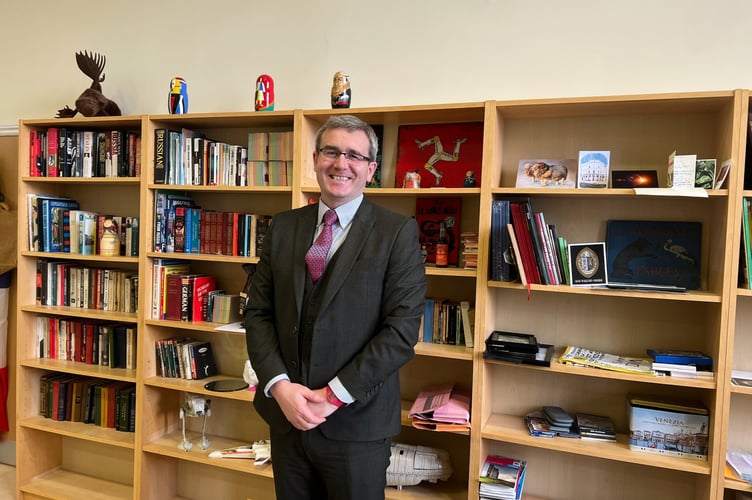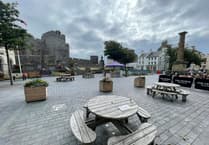A Tynwald petitioner has questioned why a government loan was granted to King William’s College despite concerns over whether it can continue as a going concern.
An independent auditor’s report included with the latest accounts for the charity that runs the college highlights a £6.7m negative movement in funds and liabilities that exceed assets by more than £2m.
It concludes: ‘These events or conditions, along with other matters, indicate a material uncertainty exists that may cast significant doubt on the group and parent company’s ability to continue as a going concern.’
Despite this, the report notes that the directors have a ‘reasonable expectation that there are sufficient resources to continue in operational existence for the foreseeable future’.
The Department for Enterprise received a request in September last year for a £2.25m loan to assist with construction costs associated with the school’s campus consolidation project.
David Watts submitted a petition on Tynwald Day this month calling for a select committee investigation into the circumstances that led to the offer of the £2,256,395 government loan to the independent school.
He questions why Treasury gave concurrence to the request for funding assistance despite concerns over the college’s financial position.
Mr Watts, of Castletown, said: ‘Amazingly, when this loan was approved on March 26, 2025, neither the DfE or Treasury would have had sight of the latest audited accounts.
‘These were only submitted to the charities regulator on May 30 this year - well beyond the six month period from end of accounting year required by charities legislation.’
College principal Damian Henderson admitted at the time that the college’s financial position was ‘delicate’.
A Treasury paper submitted by the DfE in relation to the loan underlines concerns over the college’s finances, and highlights the impact of the UK government’s announcement that private schools will no longer be exempt for VAT.
It states: ‘KWC do not believe that their customers will be able to afford the necessary 15% increase and will react by removing their children.
‘KWC is currently pursuing a strategy of limiting the amount of cost increases passed on while attempting to reduce operational costs and increase some other income streams.
‘Despite this, on the projections that have been provided to DfE, it is estimated that KWC will no longer be a going concern by 2025-26.’
It adds: ‘Providing government financial support to a private school certainly presents some political risk.’
The paper notes that private schools are currently facing several significant challenges which affect their financial viability, and King William’s College needs to remain ‘relevant and sustainable’.
It adds: ‘It is not clear what the economic impact would be if King William’s College was to close and if this would deter people from relocating to the Isle of Man.’
In a statement, the college principal Mr Henderson said: ‘We’d prefer to pass on making a comment about the petition.
‘Petitions to Tynwald are a matter for Tynwald and we don’t want to get in the way of a Tynwald process. No-one here has read the petition and we don’t have anything else to add to the information about KWC already in the public domain.’
Copies of the accounts for the year ending August 31 last year, and the Treasury FoI response, were supplied following a request by Mr Watts.
The £2,256,395 loan has been allocated from the Economic Strategy Fund in the form of a fully repayable grant towards two thirds of the cost of works to refurbish buildings that will become the new Buchan School and nursery.
This loan is interest-free for three years and must be repaid in full by the end of January 2029.
It aims to bridge the gap between expenditure on the project and the receipt of proceeds from the sale of the Buchan’s former Westhill site.
A directors’ report included with the account talks of the 2023-24 academic year being a ‘challenging’ one.
It says a drop in student numbers has resulted in reduced fees revenue, which fell from £9.7m to £9.4m.
Pupil numbers at the College fell from 352 to 322 and the role at the Buchan dipped from 162 to 140. Boarding numbers also dropped from 65 to 43. Average pupil numbers at the nursery, however, continued to be in excess of 40.
Means-tested bursaries were provided to 69 pupils, of which 21 are children of staff.
The school employed 190 staff making it one of the largest employers in the south of the island. During the year a number applied for voluntary redundancy, reducing staff costs by around £0.5m.
Its overall budget is almost £10m and international boarders bring in over £1m to the island’s economy, while saving the government around £2m for the education of 400 island pupils who would otherwise be in state schools, the directors’ report states.
The accounts show the group and parent company had net assets of £26,946,520 and £26,799,220 respectively but they were still reliant on external funding to meet daily operating costs and essential maintenance.
Liabilities exceeded assets by £2,088,232 for the group and £2,234,715 for the company.
A £6,731,686 negative flow of funds is linked to financing of the school’s investment plans, the accounts note.
But it describes the overall operating results for the year as ‘encouraging’ with a net income of £228,058, up from £226,830 the previous year.




